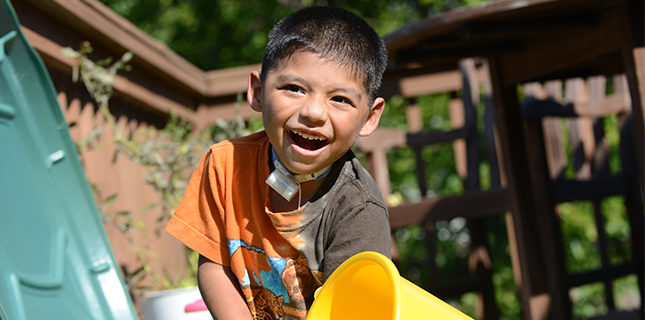Top Tips From Clinicians for Staying Safe While Enjoying the Summer Sun

Summer is a time for fun in the sun and enjoying the warm months (especially if you live somewhere like we do where many of the months are cold and snowy). But it’s also important to take steps to ensure you and your family are staying healthy and safe while out and about. Many children with medical complexities are particularly succeptible to dehydration and skin sensitivities, which makes these tips all the more important to consider as you plan your next outing.
We asked PHS clinicians for their best tips in making sure patients stay healthy and safe this summer – see what they had to say, and share any tips that you would add to the list!

- Pack extra waters, many extra waters. Igloo has a nice backpack cooler that I take everywhere with my kids. It can fit many bottles of water plus snacks. Has side pockets that I put sunscreen and hand sanitizer, also has a top zipper for extra storage. – PHS home care nurse
- Being out in the sun, heat and being more active increases your hydration needs. As a caregiver you need to be mindful of these effects and what signs to look for. Here are some common signs of dehydration:
- Urinating less
- Urine is more concentrated: it looks darker yellow. Urine should be clear to light yellow in color
- Urine has more of an odor – it can smell more intense than normal when it’s more concentrated
- Drier skin than normal – some children have dry skin, but you’re looking for a change in skin integrity
- Sunken eyes and/or dark circles around the eyes
- Sleepiness, lack of concentration and energy, irritability
- Feeling dizzy
- Rapid heartbeat
- Rapid breathing
- Lack of tears when crying (FYI, you may not see tears in infants from birth up to 2 months of age)
- Your child tries to drink bath water, lake water or water in a pool, etc.
- Decreased stooling or stools are harder in consistency and/or are hard to pass.
- If caregivers notice any of these symptoms. give extra water, Pedialyte or other hydrating fluids their child can have. If they give hydrating fluids and they are still having symptoms of dehydration they should contact their provider. Some of our kiddos are really sensitive to fluids and can become dehydrated easily. – PHS dietitian

- For the beaches that have umbrellas, we get there early (9:30/10:00) to get a good spot or consider buying your own beach umbrella for extra shade. We also bring a baseball cap for extra shade. – PHS home care nurse
- Summer always brings sun burn if outside for an extended time. One tip to enjoy outdoor activities is to always apply sunscreen at least a few minutes before leaving home and re-applying every so often while outdoors. Hats and sunglasses are also really good to protect eyes and face. – PHS home care nurse trainer
- Lip balm especially with windy environment is useful. Utilizing shades whenever available helps to prevent headaches. – PHS home care nurse trainer

- Frogg Toggs are great. It’s a cooling towel that works well and is affordable, around $10/$12. Ours came with a nice storage bottle so then you just add water. – PHS home care nurse
- I like cool wash clothes to cool clients while outside, and along with cool washcloths, a bottled water to use on the cloths is great. – PHS home care nurse trainer
- Remember ice packs if the child has enteral feeding to keep food cool on h warm day outdoor. – PHS home care nurse trainer

- iFly is like skydiving, but not. They do work with people with special needs- you just need to contact them in advance to see if they can accommodate the needs. – PHS infusion nurse
- Elm Creek Park – PHS infusion nurse
- Champlin/Maple Grove has wonderful walking trails, a man-made lake with accessible entrance and shaded areas and a huge playground- although the playground equipment is not accessible. – PHS infusion nurse
- When can a kiddo go swimming/play in the water after having their feeding tube placed. Here are MNGI’s recommendations (from initial stoma creation) – PHS dietitian:
- Bathtub: 2 weeks
- Pool: 1 month
- Lake: 2 months
-
The biggest thing I’ve learned when it comes to making the most of your summer with a medically complex kid is to plan ahead! Find things that you and your child would enjoy doing and then actually put them on the calendar. This way you can anticipate them, look forward to them, and be as mentally and physically prepared to take them head on.
Day to day life is busy and complicated enough, so often the “fun” stuff takes a back seat in priority. But I’ve seen that the more thought ahead of time, the smoother these special events/activities will go and the more meaningful they will feel. Chances are, if you don’t plan for them, they may not happen. So plan ahead, prepare, and then enjoy!

- Inhalers for those with asthma and allergy medications for allergies goes a long way. – PHS home care nurse trainer
- Oxygen tanks for those needing supplemental oxygen is important to bring even for short walks outside. – PHS home care nurse trainer
- It’s that time of year for bees so if a child has known bees allergies, always bring their EpiPen at all times and know how to use it. – PHS home care nurse trainer
- As always emergency bag is important even if it seems to appear like too much to bring-it has everything a client needs. – PHS home care nurse trainer


